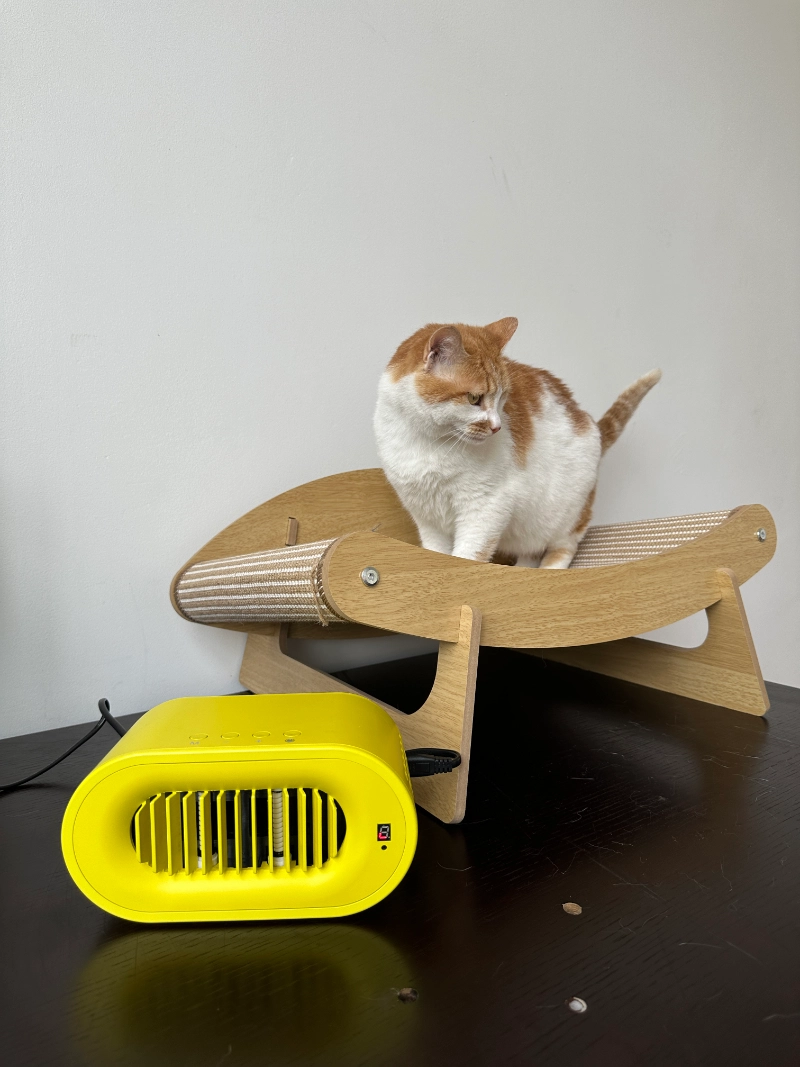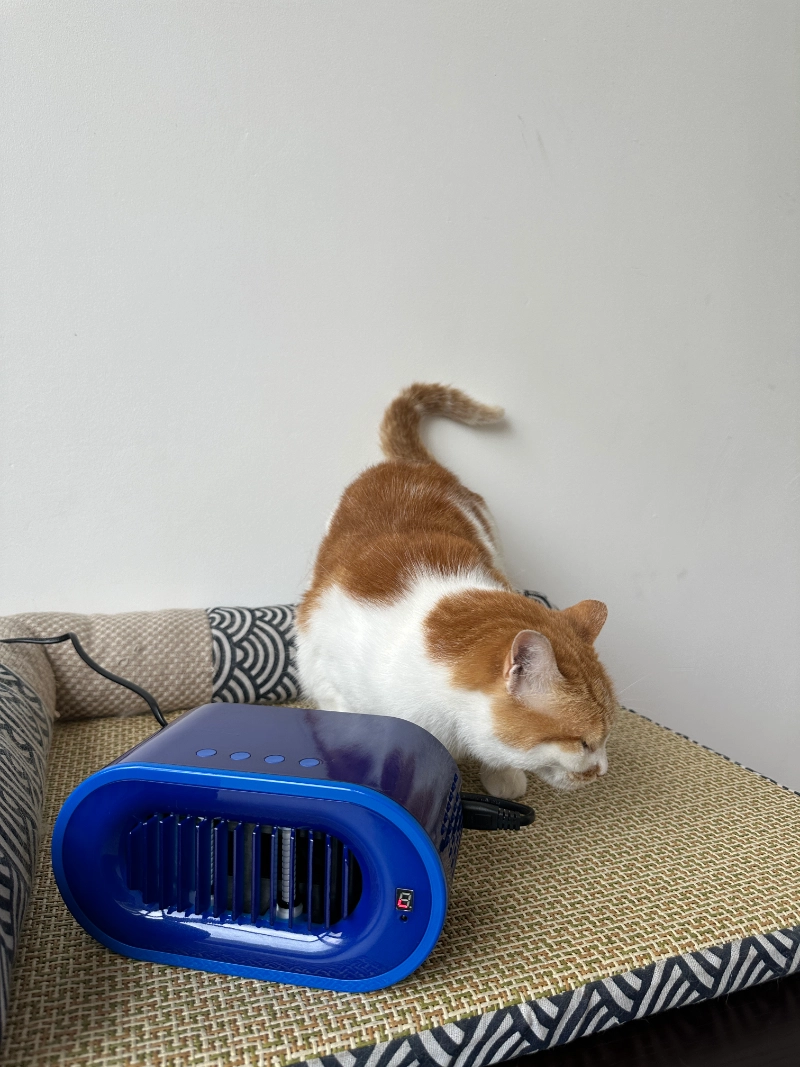- This topic is empty.
-
AuthorPosts
-
2025-01-06 at 5:39 pm #5314
Plasma air purifiers have attracted much attention for their ability to eliminate odors, improve air quality, and provide a cleaner environment in a variety of settings. In this article, RUIAIR will share the working principle of plasma air purifier for cat litter smell, specifically targeting neutralization of the pungent odors produced by cat litter boxes.
What Is Plasma Air Purifier Technology?
Before diving into how plasma air purifiers work, it's important to understand what plasma is. Plasma is often referred to as the fourth state of matter, alongside solid, liquid, and gas. While solid, liquid, and gas are common states found in everyday life, plasma is less familiar. Plasma is created when a gas is ionized by adding energy, causing electrons to be freed from atoms, which creates a mixture of positively charged ions and negatively charged electrons. This state is what you see in things like lightning, neon signs, and plasma balls.
In the context of air purifiers, plasma technology utilizes this ionization process to break down contaminants in the air. Plasma air purifiers generate a high-voltage electrical field that ionizes the air, creating reactive particles known as reactive oxygen species (ROS) and other ions that have the ability to neutralize airborne pathogens, volatile organic compounds (VOCs), and unpleasant odors.
Role of Plasma Air Purifier in Odor Neutralization
To understand how plasma technology neutralizes odors, let' s first consider how odor molecules work. Odor molecules, including those emitted by cat litter, are volatile organic compounds (VOCs) that are small, lightweight, and often have a strong, pungent scent. These VOCs are released from the litter when bacteria break down the waste material in the litter, particularly ammonia and sulfur compounds, which are known for their foul smells.
Plasma air purifiers function by producing ions that interact with these VOC molecules in a few ways:
1. Oxidation: The reactive oxygen species (ROS) produced by the plasma ionization process are highly reactive and can oxidize the volatile organic compounds. When these ROS come into contact with odor molecules, they break the chemical bonds of the molecules, neutralizing their odor-producing properties. For example, ammonia and sulfur compounds can be oxidized into less odorous and less harmful compounds, such as nitrogen and water.
2. Ionization: Plasma air purifiers also release charged ions (positively and negatively charged particles). These ions can attach to VOCs and neutralize them. In some cases, the ions directly alter the chemical structure of the odor-causing molecules, causing them to lose their pungent odor.
3. Particle Agglomeration: The charged ions produced by plasma can also cause airborne particles to cluster together, making them easier to capture in the air purifier' s filtration system, further reducing odors. This is particularly effective for fine particles like dust, dander, and litter dust that can contribute to unpleasant smells.

Working Principle of Plasma Air Purifier for Cat Litter Smell
Cat litter odors primarily stem from ammonia, sulfur compounds, and organic waste decomposition. Plasma air purifiers target these specific compounds in the following ways:
1. Ammonia Neutralization: Ammonia is one of the most common and most unpleasant odors associated with cat litter. It is produced when urea in the cat' s urine is broken down by bacteria. The high reactivity of plasma ions enables them to break down ammonia molecules into less volatile substances such as nitrogen gas and water, thus neutralizing the smell.
2. Sulfur and Mercaptan Compounds: In addition to ammonia, cat litter often produces sulfur-containing compounds, particularly mercaptans, which are responsible for the "rotten" or "sulfuric" odor. Plasma technology is effective in breaking down sulfur compounds by oxidizing them, reducing the smell of decomposing waste.
3. Microbial Deactivation: Many cat litter odors are due to the bacteria and fungi that proliferate in the moist environment of the litter box. Plasma air purifiers, by producing highly energetic particles, can deactivate bacteria and microorganisms, further reducing the source of the smell. This leads to a more hygienic environment and reduces the growth of odor-causing pathogens.
Airflow and Filtration Integration of Plasma Air Purifier
While plasma technology is the primary mechanism for odor neutralization, most plasma air purifiers also incorporate traditional filtration systems, such as HEPA filters or activated carbon filters, to capture larger particles and to provide further removal of odors. The ionized particles generated by the plasma interact with these filters to help them capture smaller particles that would otherwise be missed.
For example, activated carbon filters are highly effective at absorbing and trapping VOCs, including those from cat litter. Plasma can also help increase the effectiveness of these filters by agglomerating smaller particles into larger clusters, which are more easily trapped by the filter media.

Advantages of Plasma Air Purifiers for Cat Litter Odor
Plasma air purifiers offer several advantages when it comes to neutralizing cat litter odors:
1. Continuous Operation: Plasma air purifiers can work continuously to reduce odors in real time, preventing the build-up of unpleasant smells in the room, unlike traditional air purifiers that rely on filters and may require periodic cleaning or replacement.
2. Chemical-Free Solution: Plasma air purifiers do not require the use of chemical air fresheners, sprays, or other substances that might mask odors temporarily but do not address the root cause of the odor. Plasma technology neutralizes the odor-causing compounds directly, offering a more natural and sustainable solution.
3. Improved Air Quality: In addition to eliminating odors, plasma air purifiers also contribute to overall air purification by reducing allergens, bacteria, and other harmful airborne particles. This makes the air healthier for both humans and pets.
4. Energy Efficiency: Many plasma air purifiers are energy-efficient compared to traditional ionizers or ozone generators, making them cost-effective and environmentally friendly for long-term use.
Conclusion
Plasma air purifiers are an innovative and highly effective solution for combating the persistent and unpleasant odors associated with cat litter. Through the process of ionization, plasma purifiers can neutralize odor-causing molecules such as ammonia, sulfur compounds, and VOCs. By breaking down these compounds at a molecular level, plasma technology provides a cleaner, fresher living environment without relying on chemicals or masking agents. For cat owners looking to reduce litter box smells and improve indoor air quality, plasma air purifiers present a powerful and environmentally friendly option.
https://www.sh-ruiair.com/How-Does-Plasma-Air-Purifier-for-Cat-Litter-Smell-Work.html
http://www.sh-ruiair.com
RUIAIR -
AuthorPosts
- You must be logged in to reply to this topic.